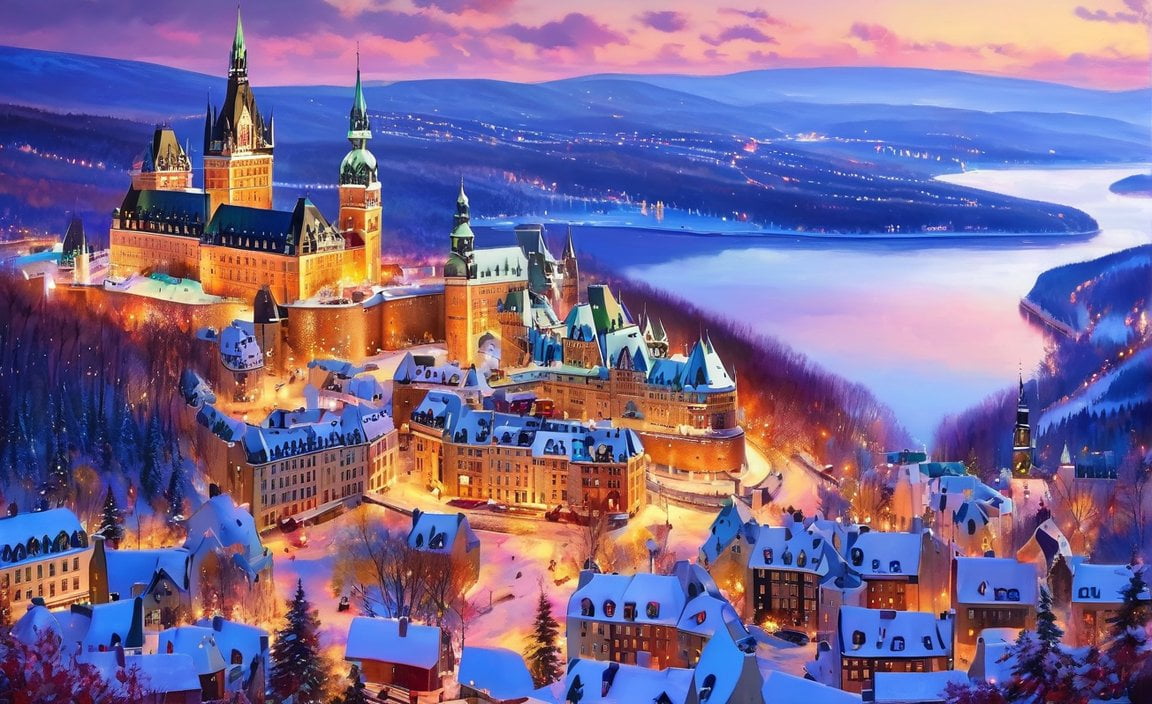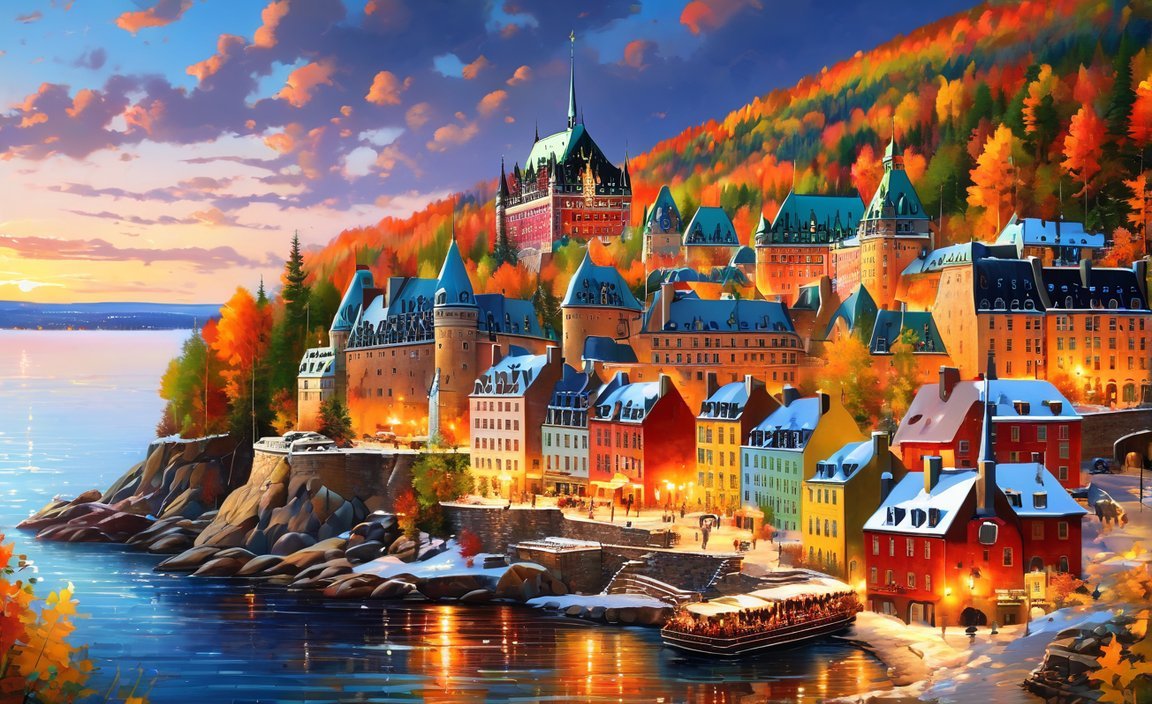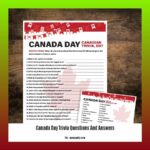Exploring Quebec: 10 Fascinating Facts Unveiling its Rich Tapestry

Québec, the largest province in Canada, holds a wealth of wonders waiting to be discovered. From the enchanting Québec City, the capital of the province, to its unique Civil Code, Québec captivates travelers from around the globe. However, it is the province’s mouthwatering cuisine that truly sets it apart. With its delectable dishes and rich culinary traditions, Québec is a haven for food enthusiasts. In this article, we will delve into the intriguing history, vibrant culture, and tantalizing flavors of Québec, uncovering ten fascinating facts that will transport you to this captivating destination.
Key Takeaways:
French-speaking Population: Quebec is known for its predominantly French-speaking population.
Oldest City in North America: Quebec City holds the distinction of being one of the oldest cities in North America.
Largest Province in Canada: Quebec is the largest province in Canada by area, covering a vast territory.
High Population: With over 8 million people, Quebec is one of the most populous provinces in Canada.
Part of Canada since 1867: Quebec became a part of Canada in 1867 when Confederation was established.
Iconic Château Frontenac: Quebec’s Château Frontenac is the most photographed hotel in the world, and it serves as a famous landmark in Quebec City.
Unique Walled City: Quebec City is the only walled city in Canada, adding to its unique charm and historical significance.
Language Promotion: Quebec passed Law 101, also known as the charter of the French language, in 1977 to promote the use of French in the province.
Abundance of Lakes: Quebec is known for its vast number of lakes, boasting over half a million within its territory.
Thriving Winter Sport: Ice canoeing is a popular sport in Quebec, where teams race on frozen rivers and lakes during the winter.
10 Interesting Facts About Quebec
Quebec, known for its vibrant culture and rich history, is a province in Canada that holds many fascinating secrets. Here are 10 intriguing facts that will take you on a journey through its captivating tapestry.
1. A French-Speaking Province
Did you know that most people living in Quebec speak French? It is the only province in Canada with French as its official language. This linguistic uniqueness adds a touch of European charm to the province, making it truly distinct from the rest of the country.
2. The Oldest City in North America
Quebec City, the capital of Quebec, holds a remarkable title. Dating back to 1608, it is one of the oldest cities in North America. Its beautiful cobblestone streets, fortified walls, and historic architecture transport visitors back in time, immersing them in centuries of culture and heritage.
3. An Expansive Province
Covering a vast territory, Quebec holds the title of being the largest province in Canada by area. Its sprawling landscapes encompass diverse geography, from majestic mountains to picturesque valleys and bustling cities, providing endless opportunities for exploration and adventure.
4. A Populous Province
With a population of over 8 million people, Quebec is one of the most populous provinces in Canada. Its dynamic and diverse communities contribute to a vibrant cultural scene, making it a hub for art, music, and culinary delights.
5. A Province with a Rich History
In 1867, Quebec became a part of Canada when Confederation was established. This historical milestone marked the beginning of a unique journey for Quebec, intertwining its French heritage with the fabric of the country, creating a province with a distinct identity.
6. The Most Photographed Hotel in the World
Quebec’s Château Frontenac is an iconic landmark that steals the hearts of visitors and photographers alike. Known as the most photographed hotel in the world, its majestic presence dominates the Quebec City skyline, offering breathtaking views of the St. Lawrence River and the old city below.
7. A City Within Walls
Imagine walking through the only walled city in Canada. Quebec City’s fortifications, dating back to the 17th century, add an extra layer of charm and history to the city. Strolling along these ancient walls allows you to immerse yourself in the past and marvel at the modern cityscape beyond.
8. Language Preservation
In 1977, Quebec passed Law 101, commonly known as the charter of the French language. This legislation aimed to promote the use of French in the province, ensuring the preservation of the French heritage and cultural identity that defines Quebec.
9. Land of Lakes
Quebec is a haven for nature lovers with its sheer number of lakes. With over half a million lakes within its territory, the province offers breathtaking landscapes, pristine fishing spots, and the perfect backdrop for summer adventures and winter wonders.
10. Ice Canoeing Thrills
When winter arrives, Quebec embraces a unique sporting tradition – ice canoeing. This exhilarating sport involves teams racing on frozen rivers and lakes, battling icy conditions to showcase their skill and determination. It is a testament to the province’s adventurous spirit.
Quebec is a province with a tapestry woven from a rich history, vibrant culture, and picturesque landscapes. Exploring its unique facts will leave you yearning to experience its captivating wonders firsthand. From the language to the landmarks, Quebec beckons with open arms, ready to share its stories and enchanting moments.
Check out these 10 interesting facts about Toronto and discover why this vibrant city is a must-visit destination for travelers worldwide. From iconic landmarks to cultural diversity, Toronto offers an array of fascinating experiences. Learn more about Toronto’s incredible history and attractions by clicking here.
Curious about vaping? Uncover the truth behind this popular trend with our collection of 10 intriguing facts about vaping. From its origins to its impact on health, this article sheds light on this controversial subject. Dive into the world of vaping by clicking here.
Explore the remarkable journey of the legendary Vasco da Gama with our compilation of 10 captivating facts about this renowned explorer. From his groundbreaking voyage to his triumphs and challenges, Vasco da Gama’s story is truly inspiring. Hear more about his remarkable life by clicking here.
Delve into the wonders of Vatican City and unravel its secrets with our fascinating collection of 10 incredible facts. From its status as the smallest country in the world to its rich history and treasures, Vatican City holds endless marvels. Experience the allure of this unique destination by clicking here.
Québec is the only province with its own Civil Code.
Did you know that Québec is the only province in Canada with its own Civil Code? This unique legal framework sets Québec apart from the other provinces and plays a crucial role in governing various aspects of law in the province.
1. The Foundation of Québec Law:
The Civil Code of Québec, also known as the CCQ, has been in force since January 1, 1994. It serves as the foundation for all other laws in Québec and governs three core areas: persons, relations between persons, and property. This comprehensive code covers a wide range of legal issues and ensures uniformity in Québec’s legal system.
2. The Ten Books of the Civil Code:
The CCQ is organized into ten books, each addressing different areas of law. These books cover important topics such as persons, family, successions, property, obligations, evidence, prescription, publication of rights, and private international law. By encompassing such a broad spectrum of legal matters, the CCQ provides a comprehensive framework for Québec’s legal system.
3. Influences and Evolution:
The roots of the Civil Code of Québec can be traced back to the adoption of the Civil Code of Lower Canada in 1866. The code drew inspiration from both the Napoleonic code and English law, with significant input from judicial interpretations of existing laws in Lower Canada. However, the modernization and revision process of the code began in 1955, taking into account societal changes and developments in legal theory. Extensive consultations and the production of reports culminated in the enactment of the revised code in 1994.
4. The Scope of the Civil Code:
While the Civil Code of Québec serves as the foundation of Québec law, it is important to note that other laws may complement or make exceptions to it. However, the CCQ remains the principal reference for legal matters in the province. Its comprehensive nature allows for consistency and predictability in legal outcomes while accommodating evolving societal needs.
5. The Importance of the Civil Code:
The Civil Code of Québec plays a pivotal role in shaping the legal landscape of the province. It provides a clear framework for resolving disputes, protecting individual rights, and regulating various aspects of private and public life. By recognizing the unique cultural and historical heritage of Québec, the CCQ offers a legal system that aligns with the province’s collective values and aspirations.
Key Takeaways:
- Québec is the only province in Canada with its own Civil Code.
- The Civil Code of Québec has been in force since January 1, 1994.
- The CCQ governs persons, relations between persons, and property and serves as the foundation of all other laws in the province.
- The Civil Code comprises ten books covering various aspects of law.
- The CCQ was influenced by the Napoleonic code, English law, and judicial interpretations of existing laws in Lower Canada.
- The revision process for the Civil Code began in 1955 and involved extensive consultations and the production of reports before the new Code was enacted in 1994.
- While other laws may complement or make exceptions to the Civil Code, it remains the principal reference for legal matters in Québec.
- The importance of the Civil Code lies in providing a comprehensive legal framework, protecting individual rights, and reflecting the cultural and historical heritage of the province.
Sources:
– Wikipedia – Civil Code of Quebec
Québec is known for its delicious cuisine.
Québec is a treasure trove of culinary delights, offering a tantalizing blend of flavors and traditions. Influenced by its rich history and diverse cultural heritage, Québec’s cuisine is a manifestation of the province’s unique tapestry. Let’s explore ten fascinating facts that unveil the mouthwatering world of Québec’s delicious cuisine.
Fact 1: A Culinary Evolution from French Roots
Québec’s delicious cuisine traces its roots back to 17th-century French cuisine. The combination of the labor-intensive colonial life, seasonal ingredients, and resource conservation gave birth to a distinct gastronomic identity in New France.
Fact 2: Influences from Fur Trading, Hunting, and Immigrant Cultures
Québec’s cuisine is a delightful blend of influences. From the region’s fur trading and hunting traditions to the teachings of First Nations, British and American cuisines, and various immigrant cultures, the culinary landscape of Québec is an ever-evolving tapestry.
Fact 3: Unique Québecois Dishes to Savor
Québec is renowned for its unique dishes that will tantalize your taste buds. Indulge in the iconic poutine, delectable tourtières, comforting pâté chinois, hearty pea soup, flavorful fèves au lard, savory cretons, and desserts like grands-pères, pouding chômeur, and St. Catherine’s taffy.
Fact 4: Celebrating Tradition with Holiday Fare and the Temps des Sucres
Québec’s cuisine is deeply intertwined with its cultural celebrations. Traditional holiday fare takes center stage, offering a glimpse into the province’s rich heritage. Additionally, the “temps des sucres” in March provides families with the opportunity to visit sugar shacks and indulge in the magic of maple syrup season.
Fact 5: The Maple Syrup Capital of the World
Québec boasts the title of the largest producer of maple syrup globally, with a staggering 72% of the world’s supply and 90% of Canada’s production originating from the province. Immerse yourself in the sweet essence of Québec’s culinary identity, enriched by this golden elixir.
Fact 6: A Haven for Cheese Lovers
Québec takes cheese seriously, and it shows in the staggering variety available. With over 700 different types of cheese, many of which have won international contests, Québec offers a world of flavors and textures to delight any cheese lover’s palate.
Fact 7: Akin to Acadian Cuisine
Québec’s cuisine shares many similarities with Acadian cuisine due to proximity and shared language and history. This connection enhances the gastronomic experience, showcasing the intermingling of cultures that have shaped Québec’s culinary landscape.
Fact 8: Embracing Heritage from Northern France and Poitou
Québec’s cuisine also draws inspiration from its French roots. Hailing from Northern France, the culinary heritage of Québec retains elements of the Poitevin cuisine, further enriching its diverse flavors and traditions.
Fact 9: Highlighting Unique Ingredients
Québec’s abundant natural resources play a vital role in its cuisine. From game and seafood to fish, pickled beets, and the wide variety of Québecois cheeses, each ingredient adds a distinctive touch to the culinary creations of the province.
Fact 10: A Culinary Journey through History
The cuisine of Québec reflects the realities of its history. From historical poverty leading families to hunt for sustenance in the past, to the culinary changes brought about by the Conquest of New France in 1760 and the socio-economic interactions with New England, Québec’s cuisine is an ever-evolving narrative of the province’s past and present.
Key Takeaways:
– Québec’s cuisine evolved from 17th-century French cuisine, influenced by the labor-intensive nature of colonial life.
– The province’s history of fur trading, hunting, and immigrant cultures have shaped its culinary identity.
– Iconic Québecois dishes such as poutine, tourtières, and pâté chinois showcase the province’s unique flavors.
– Québec’s cuisine is deeply intertwined with traditional holiday fare and the “temps des sucres.”
– The province is the largest producer of maple syrup globally, with over 700 different types of cheese to savor.
– Acadian and Northern French culinary influences are evident in Québec’s cuisine.
– Québec’s cuisine incorporates unique ingredients like game, seafood, fish, pickled beets, and Québecois cheeses.
– The culinary journey through Québec’s history highlights the province’s resilience and cultural interactions.
Sources:
– Wikipedia: Cuisine of Quebec
– The Spruce Eats: Cuisine of Quebec

FAQ
Q1: What is the largest province in Canada?
A1: The largest province in Canada is Quebec.
Q2: Which city is the capital of Quebec?
A2: Quebec City is the capital of Quebec.
Q3: Does Quebec have its own Civil Code?
A3: Yes, Quebec is the only province in Canada that has its own Civil Code.
Q4: What is Quebec known for in terms of its cuisine?
A4: Quebec is known for its delicious cuisine, which has evolved from 17th-century French cuisine and incorporates influences from First Nations, British cuisine, American cuisine, and immigrant cuisines.
Q5: Are there any unique dishes associated with Quebec?
A5: Yes, Quebec has several unique dishes, such as poutine, tourtières, pâté chinois, pea soup, fèves au lard, cretons, and a variety of traditional desserts like grands-pères, pouding chômeur, and St. Catherine’s taffy.
- Unlock Filipino Culture: A Deep Dive into Traditions and Practices - April 23, 2025
- Unlock Spanish Culture: Insights & Opportunities Now - April 23, 2025
- White Spirit Uses & Substitutes: A Deep Dive for Pros & DIYers - April 23, 2025
















